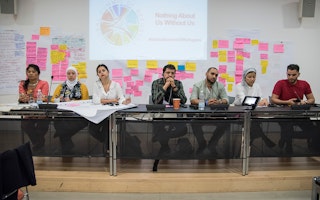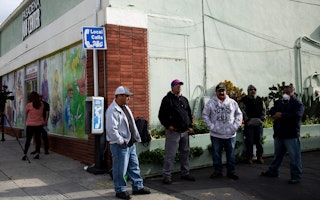Immigration Reform Is a Women’s Issue
By Ai-Jen Poo
Eleven million people in the United States live in fear of deportation. These are people who love and care about their families. Often we rely upon them to love and care for our families as well. There really is no “us” or “them.” We are deeply interdependent, not just economically, but through our caring relationships. We need immigration policies that reject “us versus them” approaches and instead support integration and connection between all Americans, including aspiring Americans.
Domestic work remains one of the few professions available to immigrant women in major cities. Approximately two-thirds of nannies, housekeepers and caregivers for the elderly are foreign born, and about half of them are undocumented. Yet lack of status and ability to work legally in the United States make domestic workers especially vulnerable to exploitation and abuse. A 2012 study found that 85 percent of undocumented domestic workers who work in substandard conditions do not complain because they fear their immigration status will be used against them. With these strains and insecurities, turnover and burnout is common, which is catastrophic for everyone involved. Stability and professionalism in this industry requires that we revise our policies. Given that our needs for caregivers are expanding exponentially, we need a roadmap to citizenship for all in order to sustain our families.
Another issue at the intersection of immigration policies and family caregiving is family separation resulting from deportations. In the fourteen months between July 1, 2010, and September 31, 2012, a total of 204,810 deportations were issued for parents with U.S. citizen children, according to federal data unearthed by the Applied Research Center (ARC). Undocumented women are being told that they have to sign off on voluntary deportation papers or agree to be guilty on criminal charges, with the carrot that they’ll be able to be reunited with their children. Once you self-deport, you can’t come back. Women are being separated from their families without the hope of ever coming back. ARC conservatively calculates that about 1.25 percent of the children in foster care in the United States are in this situation, and that at this rate, at least 15,000 more children will face separation from their detained and deported parents in the next five years. Half of California’s children have at least one immigrant parent.
Most domestic workers came to the United States because they wanted to create a better life for their children and support their families back home. Having experienced the indignities and sacrifices that go along with being a low-wage worker, to then be ripped apart from new families here in the United States—both the ones to whom they provide care, and any children born in the United States. No one responsible for caring for the most precious elements of our lives—our homes and our families—should be at risk of being torn from their homes and families as a result of our immigration policies.
Because of the intersection between domestic workers and immigration policies, my organization, the National Domestic Workers Alliance (NDWA) helped create a nationwide campaign called We Belong Together, partnering with the National Asian Pacific American Women’s Forum, and a women and children’s advocates around the country, including the Women’s Refugee Commission, Momsrising.org, First Focus: Campaign for Children, and Ultraviolet. Led by women and children, We Belong Together calls for a society that puts women and children at the center of a vision for a healthy, multiracial democracy where all of our families and communities may flourish. We are working to ensure full inclusion of women and caregivers in the path to citizenship, and to strengthen family unity. We want to shine a light on the impact of anti-immigrant sentiment on all of our families and communities, and put forward a vision of a new America that holds possibility and dignity for all.
We Belong Together is a grantee of the Open Society Foundations.
Ai-jen Poo is director of the National Domestic Workers Alliance.


